
Why Do Ukrainians Want to Join the EU and What Scares Them Most?
What does sociology say?
There was joy anyway, despite the fact that in previous weeks everyone who could and knew something had spoken in advance about the future decision, starting from journalists and diplomats to members of the Ukrainian government and Brussels officials. This, however, did not make the European Commission’s recommendation to start negotiations with Ukraine on accession to the EU any less significant or desirable.
Even though not many of our compatriots today fully understand how complex and tortuous the path lies ahead of us, what obstacles await us on this path and how we have to change the country in order to become a full member of the European Union, we will think about this tomorrow. Ukrainians deserve at least a little joy today, with the hope that their elected authorities will do everything possible and demonstrate greater progress in implementing the recommendations of the European Commission, so that in a month, at the December summit, the heads of government and states of the European Union will decide to begin accession negotiations with Ukraine. Although it should be noted that, legally, this process will most likely begin no earlier than the spring of next year, as Kyiv was given time to complete work on the implementation of the seven recommendations of the European Commission until March, when its members will prepare a new assessment of Ukraine’s progress. After this, a so-called intergovernmental conference should take place, which will allow the start of official negotiations on Ukraine’s accession to the European Union.
This event is among the greatest aspirations of Ukrainians, which was confirmed by the results of a sociological study by ZN.UA, conducted in collaboration with the Razumkov Center. We asked our fellow citizens which of the listed events they would most like to happen over the next year, giving them the opportunity to choose up to three proposed options. As was absolutely expected, the majority of Ukrainians want Ukraine to win the war with Russia: this answer was chosen by 76.8% of respondents. And 35.5% of respondents, apparently assessing the situation more realistically, want Ukraine to continue to liberate its territories from Russian occupiers in the coming year. The top three desires also included Ukraine receiving an invitation to become a member of the North Atlantic Treaty Organization (NATO) – this option was chosen by a third of respondents (33.7%), which is understandable, since the same opinion poll showed that Ukrainians consider Ukraine’s membership in the Alliance to be the most reliable guarantee of security for our country.
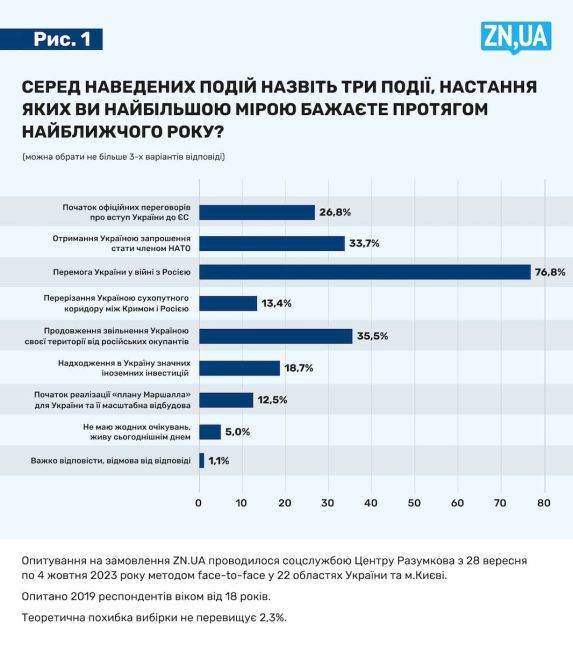
The start of official negotiations on Ukraine’s accession to the European Union is ranked right after successes at the front and an invitation to the North Atlantic Treaty Organization (NATO) in the ranking of Ukrainians’ wishes for the coming year: this item was chosen by more than a quarter of respondents (26.8%). At the same time, it is important to recall that Ukraine’s membership in the European Union is supported by the majority of Ukrainians, which was once again confirmed by a recent social survey by the Kyiv International Institute of Sociology (KIIS), commissioned by the European Union Advisory Mission: 77% of respondents believe that it is important for Ukraine to become part of the European Union.
When will this happen? Despite the war, Ukrainians are quite optimistic: a total of 60.5% of participants in the ZN.UA survey believe that our country can join the European Union in less than 10 years. And 54.8% of respondents assume that this will happen before 2030, which, when speaking about the enlargement of the European Union, was the target spoken about by both the members of the Union itself and Ukraine by the head of the European Council Charles Michel. The latter, however, voiced a certain reservation: “if both parties do their homework.” A fifth of Ukrainians are more optimistic than representatives of our executive branch, with 20.6% of respondents having answered that Ukraine would join the European Union within two years. Prime Minister of Ukraine Denys Shmyhal and Deputy Prime Minister of Ukraine for European Integration Olha Stefanishyna, however, believe that within two years Ukraine will only be ready to join the European Union, that is, it will not join it yet. They say this because they are aware of the difficulties of the upcoming internal reform of the European Union, and the need for ratification of the treaty on the accession of a new member of the European Union by all current ones, and today there are 27 of them. On average, the ratification process alone takes about two years. Therefore, it is understandable that more than a quarter of those who took part in our survey (27.8%) chose the “Difficult to answer” option or refused to answer. Because honestly, today not a single person in the world can give an exact answer as to when Ukraine will become a member of the European Union.
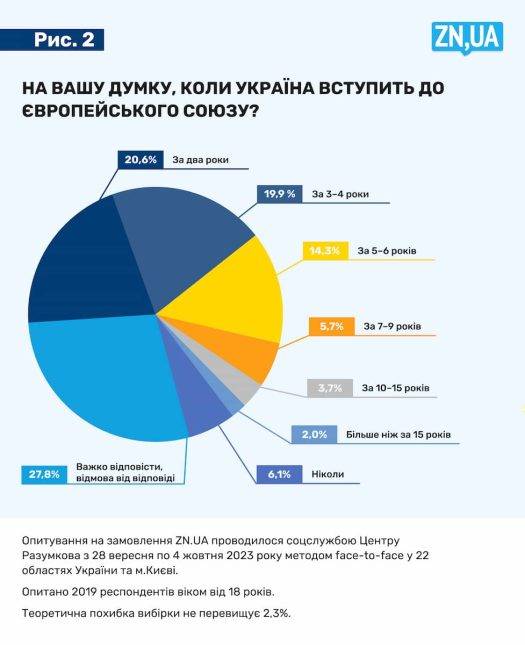
Why do Ukrainians want to join the European Union, and what exactly do they consider the biggest positive aspect of Ukraine’s future membership in the EU? We offered our respondents one and a half dozen answer options, allowing them to choose no more than three of them.
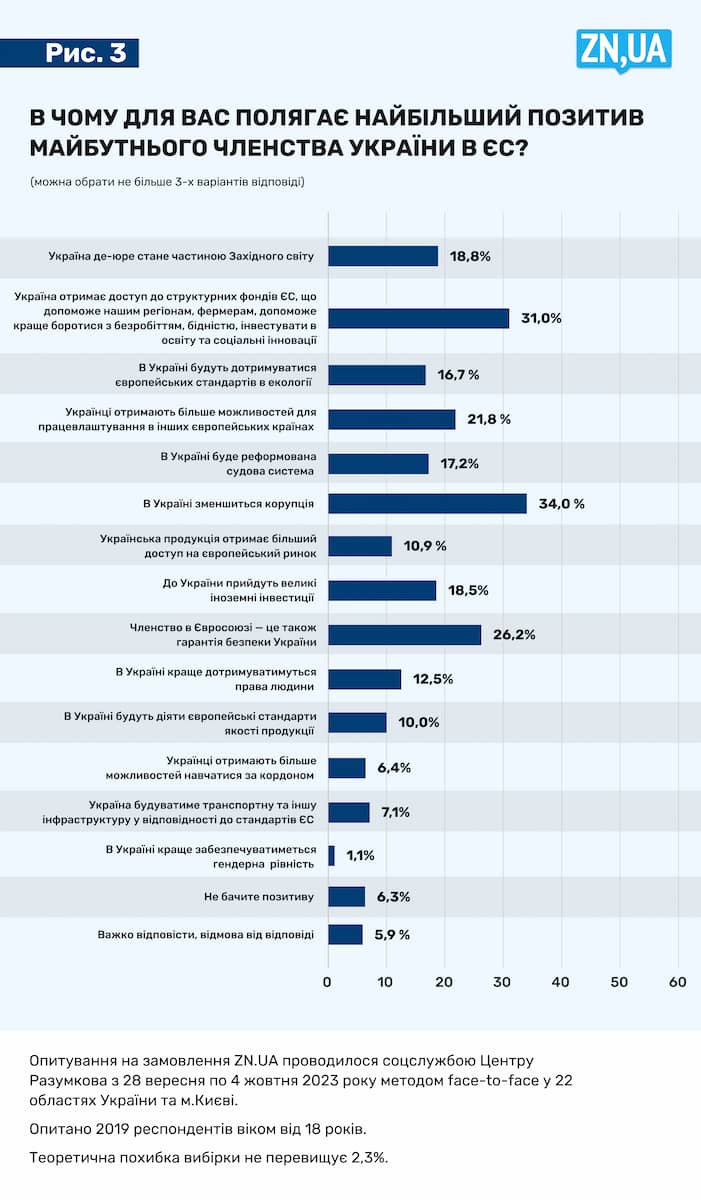
Ukrainians place their greatest hopes on the fact that in the process of joining and gaining membership in the European Union corruption will decrease in Ukraine: this answer was chosen by 34% of respondents. Corruption in our country is a constant focus of the European Union and its institutions. The fact that we must effectively fight this evil was one of the seven recommendations of the European Commission, the implementation of which is necessary to begin negotiations on Ukraine’s accession to the European Union. The European Commission report presented yesterday noted that “Ukraine has intensified reforms in this area after receiving candidate status for the European Union.” Nevertheless, the European Commission also indicated what still needs to be done in the near future, for example, increasing the number of employees of the National Anti-Corruption Bureau of Ukraine (NABU), prosecutors of the Specialized Anti-Corruption Prosecutor’s Office (SAPO) and judges of the High Anti-Corruption Court of Ukraine (HACC), and to provide additional protection for the SAPO “from possible unlawful interference.” Brussels also expects Kyiv to continue investigations and verdicts in already ongoing cases of corruption at the highest level.
Ukraine’s access to the EU structural funds is one of the main attractive factors of the European Union for our fellow citizens (at least for 31% support). Perhaps they are still poorly informed about what funds exist and how many there are, who has the right to receive funding from them, what amount and under what conditions. However, Ukrainians have heard a lot about how, thanks to these funds, the new members of the European Union had raised their economic indicators, how their GDP per capita had grown, and poor regions had revived. So, they hope that access to structural funds will help the development of our regions, bringing their level up to the European Union level; support farmers with subsidies, equipment, seed material; help combat unemployment and poverty better. In addition, Ukrainians also hope that access to EU funds will help invest in education and social innovation.
More than a quarter of respondents (26.2%) are confident that membership in the European Union is also a guarantee of Ukraine’s security. Moreover, this conviction was expressed even before the heads of EU governments and states recorded in the final document their intention to work on the Union’s security obligations to Ukraine at the summit at the end of October. These security obligations “will help Ukraine defend itself, counter attempts at destabilization, and deter future acts of aggression.” As a reminder, the decision to hold consultations with Ukraine on the EU’s future security obligations to it was also approved at this summit, with their results to be considered at the December meeting of the European Council.
Almost one-fifth of respondents (18.8%) understand the geopolitical importance of our country’s future membership in the European Union: it is important for them that Ukraine will de jure become part of the Western world. And this will be another defence against the “Russian world.”
For more than a fifth of Ukrainians (21.8%), membership in the European Union is important for obtaining greater employment opportunities in other European countries. It is expected, but at the same time alarming, that the younger the respondents, the more interested they are in the proposals of the European labour market at a time when the Ukrainian labour market has been acutely short of labour for a long time. In the age group 60+ only 14.2% of respondents chose this item, while in the group of 18–29 years olds, the respondents were as many as 31.4%, that is, almost a third.
At the same time, to be honest, there was a surprisingly small percentage of respondents – only 6.4%, who noted the provision of greater opportunities for Ukrainians to study abroad as a positive indicator. Of course, the youth group of 18–29 year olds still had a better result than the people over 60 (10% versus 4.8), but this is still a very low percentage. This may be explained by the low level of knowledge of foreign languages among Ukrainians, poor awareness of opportunities to study abroad, including for free, as well as the persistence of the myth that “our education is the best in the world.”
There is also a low percentage of those for believe that better respect for human rights in the EU is a positive aspect; this point was chosen by only 12.5% of respondents. Although it is unlikely that Ukrainians can be completely satisfied with how their rights are respected in our country. The European Commission, in a report released yesterday, provided a list of areas in which Ukraine needs to significantly improve the situation – from preventing torture and adopting legislation on the protection of personal data that corresponds to European legislation, to improving the situation of children and elderly people in residential institutions, as well as people with disabilities. It should be emphasized that the section of fundamental rights is included in the first so-called negotiation cluster, which, unlike all the others, will not be closed until the very end of negotiations on the country’s accession to the European Union. And the European Commission will evaluate Ukraine’s progress in the sections included in this cluster throughout the entire negotiation process. In fact, ensuring gender equality, which was noted by as many as 1.1% of respondents, also falls into this section.
“What scares you most about Ukraine’s future membership in the European Union?” – we also asked the Ukrainians this question and offered to choose no more than three of the proposed answer options. It is pleasant that almost a quarter of our fellow citizens (24.1%) choose a European future without fear, and in the youngest age group there are even 29.2% of such decisive people.
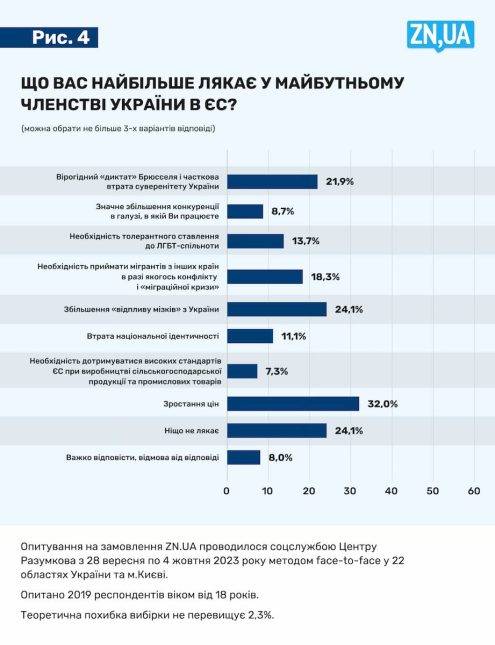
Most of all, Ukrainians are afraid of Ukraine joining the European Union because they are afraid of rising prices: this was stated by a third of respondents (32%). Even now people are watching with alarm the already too frequent change of price tags at stores and markets, and they are afraid that in the future prices will become even higher. Representatives of the younger generation (18–29 years of age) are least concerned about this problem (only 24.2% of respondents); in other age groups, the number of those who chose this answer is approximately the same and slightly exceeds the average, reaching a maximum (34.8%) in the older group, that is, those over 60.
The second most popular fear or concern is the increase in the departure of specialists in various fields from Ukraine after its accession to the European Union. This problem worries almost a quarter of our compatriots (24.1%). As we’ve already stated, 21.8% of Ukrainians named an increase in employment opportunities abroad as one of the main positive aspects of Ukraine’s membership in the European Union.
The likely strong authority of Brussels over our country and the partial loss of Ukraine’s sovereignty frightens 21.9% of our fellow citizens. We will only find out how “scary” this really is by joining the European Union. The British were irritated by the strong authority of Brussels to such an extent that they exited the European Union a certain time ago loudly slamming the door. Now most of them regret it and call Brexit a mistake, and 55% are ready to vote for returning to the European Union.
Only 11.1% of Ukrainians are afraid of losing their national identity when joining the European Union. It should be noted that the “Russian World” has been so successful in strengthening the national self-awareness of Ukrainians that membership in the European Union in this regard scares few of them now.
The need to accept migrants from other countries in the event of any conflict or “migration crisis” frightens 18.3% of Ukrainians. That’s a lot for a people, more than six million of whose representatives are still living abroad today as refugees (and by the way, immediately after the start of Russia’s large-scale invasion, there were significantly more Ukrainians accepted by other states). And it’s a lot for a country experiencing a demographic catastrophe and experiencing an acute shortage of labour resources.
The need for a tolerant attitude towards the LGBTQ+ community was noted among their fears by 13.7% of our survey participants. In general, that is not a high figure. However, it was unpleasantly surprising that with a maximum figure of 14.9% in the oldest age group (which was quite expected), almost the same figures were given by young people 18–29 years old – 14.3%. Young people found themselves in second place in their prejudices and phobias against LGBTQ+ people after those “who are already over 60 years old.” To be fair, let us mention that in its report, the European Commission noted a sharp reduction in Ukraine in “the number of registered cases of discrimination against minorities, including against representatives of LGBTQ+ people and national minorities, as well as acts of anti-Semitism.”
“What do you think will be the biggest obstacle to Ukraine joining the European Union?” Paradoxically, when answering this question from ZN.UA, Ukrainians demonstrated both great knowledge and a very significant lack of understanding of the difficulties awaiting our country on the path to membership in the European Union.
Having the opportunity to choose only one answer from the options we proposed, more than half of the respondents, namely 51.7%, named the high level of corruption in Ukraine as the main obstacle blocking its path to the European Union. After all, the point is not only that the eradication of this long-standing and shameful Ukrainian disease is closely monitored in Brussels and other European capitals, including an anti-corruption clause in all lists of “recommendations”, “conditions”, “criteria” and “demands”. And it’s not just that the closer we get to membership, the stronger the lenses will be in the optics of various specialists looking out for corruption “at all levels of society.” And it’s not that the findings of specialists will be happily used by politicians like Viktor Orban, putting Ukraine in a difficult and unpleasant position. In addition, Orban will use these findings to resolve both bilateral issues and his own problems with Brussels in his favour. The main problem is that corruption that has not been eliminated is not “just” one uncredited “subject” in the Ukrainian entrance test; it is a bad phenomenon that destroys our state and society and interferes with all reforms, slowing down all the transformations necessary for the country. And now we are talking not only about those that are needed for our entry into the European Union. Yes, probably, the fight against corruption is the most important and difficult “discipline” for Ukraine to master in our “record book,” but not the only one. However, it seems that Ukrainians still underestimate the importance of other “subjects” and the complexity of other problems.
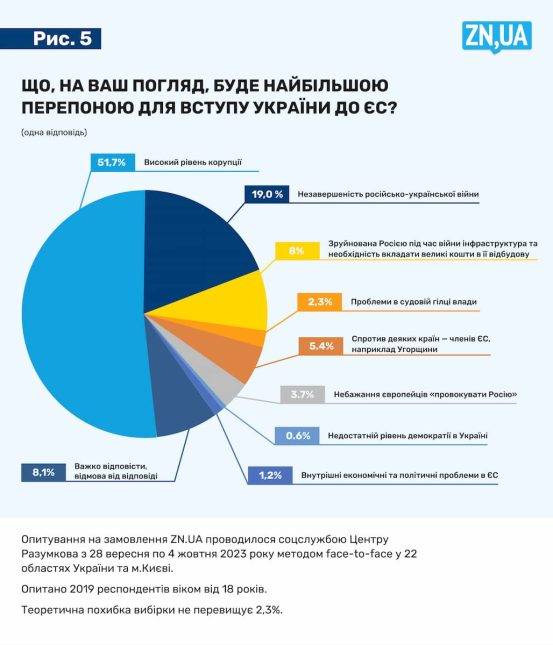
Only 0.6% of respondents believe that an insufficient level of democracy may be the greatest obstacle to our country’s accession to the European Union. But the report of the European Commission does not yet give grounds to consider Ukraine an excellent performer in democratic reforms. Therefore, let us recall that the first of the three, political, “Copenhagen criterion” of a country’s readiness for membership in the European Union is the stability of institutions that guarantee democracy, the rule of law, respect for human rights and the protection of minority rights.
Problems in the judicial branch of government were chosen as an answer by 2.3% of respondents. Although, let us remind you, 17.2% of participants in our social research called the reform of the judicial system the greatest positive aspect of Ukraine’s accession to the European Union, apparently without considering that in our country today everything is good in this area.
Almost a fifth (19%) of respondents named the fact that the Russian-Ukrainian war has not ended as the biggest obstacle to joining the European Union. And although senior European officials claim that the war factor is not an obstacle to Ukraine’s membership, European experts believe that even preparing the so-called negotiating framework for negotiations on Ukraine’s accession to the European Union “will be a very difficult political task for member countries. This task will be especially difficult in conditions where the issue of the territorial integrity of the candidate country is very serious.”
Many Ukrainians have no doubt that Hungary, and, perhaps, some other states that are members of the European Union will impose many difficult conditions on us before they agree to our country’s membership. But it is worth noting that only 5.4% named the disagreement of these countries regarding our accession as the main obstacle on the way to the European Union. On the eve of the publication of the European Commission’s report, Budapest already announced that it could block the start of negotiations between the European Union and Ukraine if its demands under the law on the language of education for national minorities are not met. And since respect for minority rights is not only included in one of the sections of the first negotiation cluster, but is also part of the political “Copenhagen criterion” for membership in the European Union, it is quite possible to expect that we will stumble upon the “Hungarian footprint” until our accession to the European Union. And by the way, this is not the only footprint we will run into. Today, to realize that friendship is friendship, but each country thinks first of all about its own interests, it is enough to look at least at the Ukrainian-Polish border, where hundreds of trucks are in a standstill.
Only 1.2% of Ukrainians consider internal economic and political problems in the European Union as the main obstacle to Ukraine’s membership – a number within the statistical error. Although, along with Ukrainian corruption, it is this factor that may become the main obstacle to Ukraine’s accession to the European Union. The upcoming numerous elections in the countries of the European Union and the European Parliament, the new composition of the European Commission, which is not necessarily as pro-Ukrainian as the current one, are all serious risk factors for our European integration.
Ukrainians call access to the structural funds of the European Union one of the main positive aspects of future membership in the European Union. But what will be the reaction of the current member states, which may lose a significant part or even stop receiving funds from these funds as a result of the accession of Ukraine, which is a large and very poor country, moreover, significantly destroyed by the war unleashed against it by Russia? Are member states ready to increase their contributions to the European Union budget for future enlargement? Do the member states of the European Union agree to sacrifice their part of the “pie” of European Union funds in favour of Ukraine? To date, only Estonia has announced this. How do our closest friends and influential partners, for example Poland and France, feel about the prospect of fierce competition with the Ukrainian agricultural sector?
There are a lot of such important questions now. But we’ll think about this tomorrow. And today we will simply rejoice at what we could only dream of yesterday, namely that Ukraine has already come as close as possible to the start of negotiations on accession to the European Union.
The survey, commissioned by ZN.UA, was conducted by the sociological service of the Razumkov Center from September 28 to October 4, 2023 using the face-to-face method in 22 regions of Ukraine and Kyiv. Also, 2019 respondents aged 18 years and older were surveyed. The theoretical sampling error does not exceed 2.3%.
Media, Publications
-
Deputy Ambassador of the EU on enlargement, reforms and €190 billion in support
-
EU membership in 2030? Deputy Ambassador of the EU answers students’ questions
-
How does the EU take decisions on Ukraine? Subsidiarity, unanimity and consensus among 27 countries
-
What reforms does Ukraine still need to join the EU? Deputy Ambassador of the EU answers
-
How can Ukrainian students become more involved in EU programmes and projects? Deputy Head of the EU Delegation answers
-
Are there alternatives to European integration if the road to the EU is long? Deputy Ambassador of the EU answers